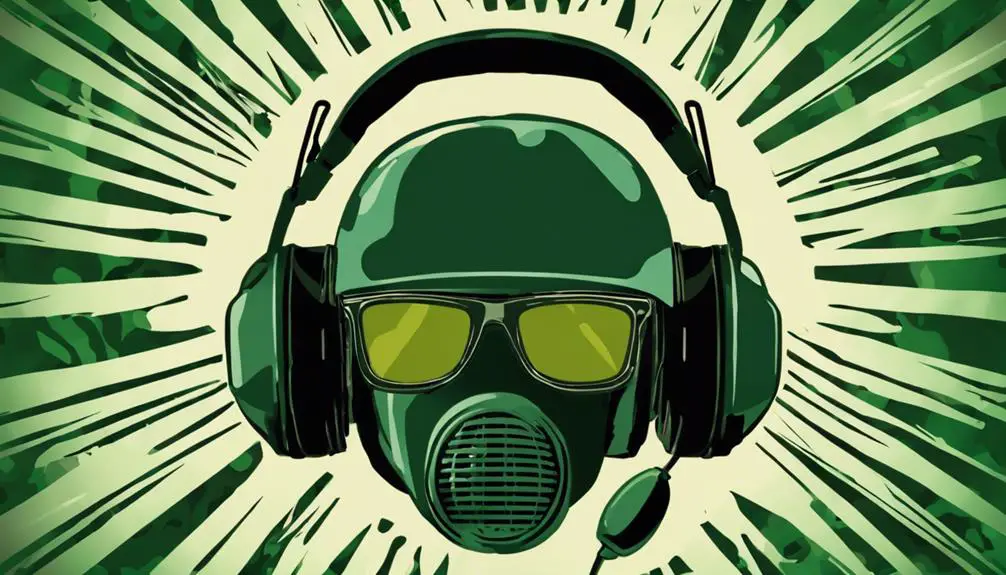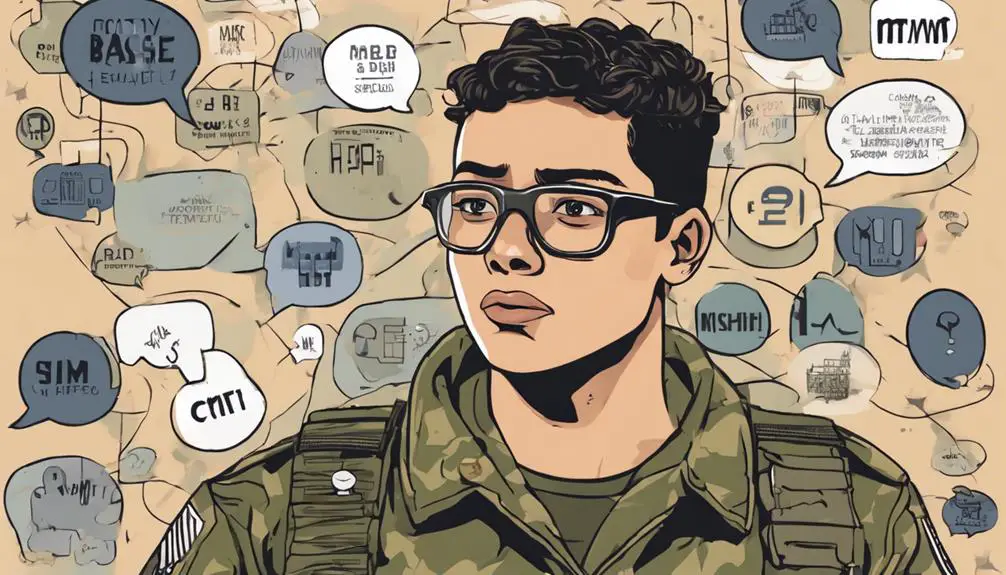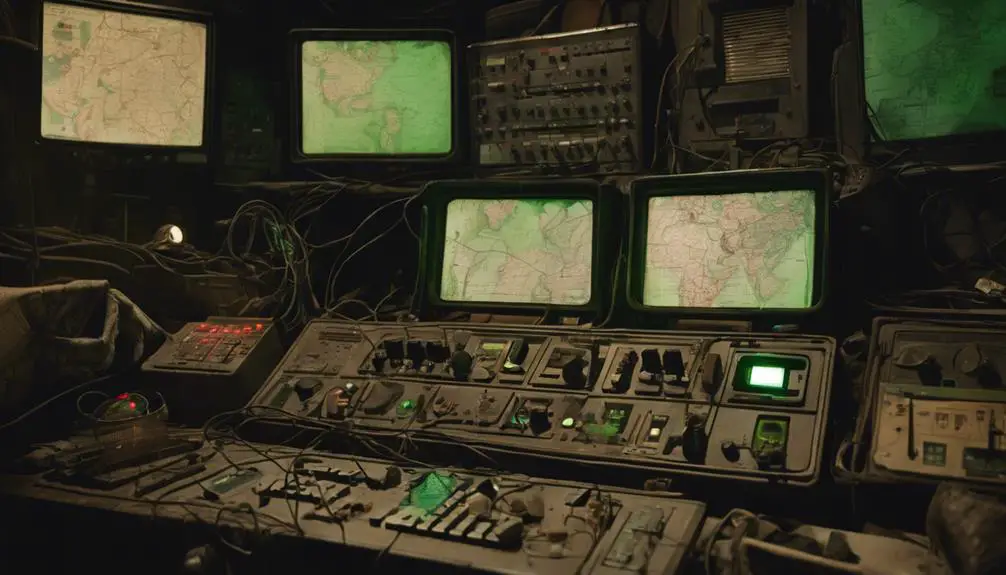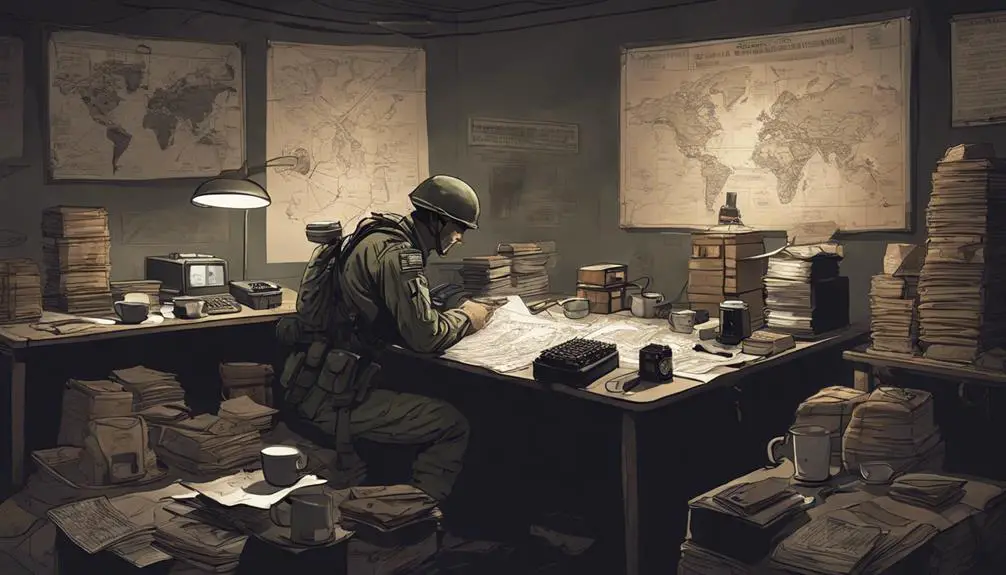You're about to enter a world where military slang rules. In this world, 'buzzed' means being extremely busy, not intoxicated. You'll need to know that 'O-dark-thirty' is an ungodly early hour, and 'FNG' is a newbie. Mastering military slang is essential for effective communication and maneuvering military life confidently. From 'ROE' to 'SOP', acronyms and abbreviations dominate military conversation. As you explore the world of military lingo, you'll discover specialized terminology, ops and intel jargon, and classified communication codes. Keep going to uncover the secrets of military slang and become a master of military communication.
Military Lingo 101

When you enlist in the military, you're immediately immersed in a unique cultural environment where colloquialisms and specialized terminology rule everyday conversation. Military lingo is a language of its own, and mastering it's essential to fit in and communicate effectively with your comrades.
You'll quickly learn that Warrior Wisdom and Battle Banter are integral parts of military culture. Warrior Wisdom refers to the unwritten rules and sayings that have been passed down through generations of service members. These phrases, such as 'Honor, Courage, Commitment,' serve as guiding principles for military personnel.
Battle Banter, on the other hand, involves the use of humor and sarcasm to cope with the stresses of military life. It's not uncommon to hear service members jokingly refer to their commanding officer as 'the old man' or teasing each other about their misadventures.
Decoding Acronyms and Abbrevs
You'll encounter a multitude of acronyms and abbreviations in military communication, requiring you to quickly decipher their meanings to stay on the same page as your comrades.
Understanding the origins of these shorthand terms is vital to effective communication. Acronyms, like NATO's 'SITREP' (Situation Report), have origins dating back to World War II, when brevity was essential for efficient communication.
To decode these cryptic messages, you'll need a codebreaker's toolkit. Familiarize yourself with common abbreviations, such as 'ROE' (Rules of Engagement) and 'SOP' (Standard Operating Procedure).
Create a mental or written dictionary of frequently used acronyms to reference during critical situations. Practice active listening and ask for clarification when unsure of an acronym's meaning.
Slang for New Recruits

As you step into the boots of a new recruit, familiarizing yourself with military slang becomes essential to avoiding confusion and frustration.
You'll soon discover that military slang is a unique language that can be overwhelming, especially during Boot Camp Basics. It's important to learn the lingo to fit in with your unit and understand orders.
Here are some essential slang terms to get you started:
- Newbie Nicknames: Familiarize yourself with common nicknames like 'Boot' or 'Newbie' that refer to new recruits like yourself.
- FNG: Short for 'Freaking New Guy,' this term is often used to tease new recruits in a lighthearted manner.
- O-Dark-Thirty: This term refers to an extremely early morning hour, often used to describe the ungodly hours of physical training.
- Rack Time: This phrase refers to bedtime or sleeping hours, which are important for a good night's rest before the next day's training.
Mastering these slang terms will help you navigate the military world with confidence.
Ops and Intel Jargon
Now that you've got a grip on basic military slang, it's time to decode the specialized language of operations and intelligence, where cryptic phrases and abbreviations reign supreme. In this domain, understanding the terminology is vital for effective communication and mission success.
Here's a breakdown of key terms to get you started:
| Term | Definition | Application |
|---|---|---|
| COIN | Counter-Insurgency | Covert operations to counter rebel groups |
| HUMINT | Human Intelligence | Gathering info from human sources |
| IMINT | Imagery Intelligence | Surveillance via aerial or satellite images |
| OPSEC | Operational Security | Protecting sensitive info from enemies |
| SIGINT | Signals Intelligence | Intercepting electronic communications |
In the world of ops and intel, mastering these terms is essential for successfully maneuvering through complex missions and staying one step ahead of the enemy. Covert operations, surveillance techniques, and strategic planning all rely on a deep understanding of these specialized terms. By familiarizing yourself with this jargon, you'll be better equipped to contribute to mission success and stay ahead of the curve.
Radio Chatter Secrets

When tuning into military radio communications, deciphering cryptic phrases and coded messages can be a challenging task, but understanding the nuances of radio chatter is crucial for staying informed and ahead of the enemy.
As you listen in, you'll notice that military personnel use specific terminology and techniques to maintain secure and efficient communication.
Some key aspects of radio chatter to be aware of include:
- Frequency Hopping: A method of rapidly switching between multiple frequencies to minimize interception and jamming risks.
- Secure Channels: Dedicated communication networks, often encrypted, to guarantee sensitive information remains confidential.
- Call Signs: Unique identifiers assigned to individuals, teams, or units to quickly establish communication and authenticate identities.
- Brevity Codes: Pre-defined phrases or words used to convey complex information concisely, reducing transmission time and minimizing errors.
Base Lingo and Colloquialisms
You'll encounter a unique dialect on military bases, where colloquialisms and base lingo are used to facilitate quick communication and camaraderie among personnel. This dialect is often characterized by colloquial expressions, acronyms, and slang that are specific to each branch or unit.
On a daily basis, you'll hear 'Barracks Banter' – casual conversations that take place in the barracks, often peppered with humor and sarcasm.
In the 'Mess Hall', you'll observe 'Mess Hall Manners', a set of unwritten rules governing mealtime etiquette. For instance, it's considered impolite to eat before everyone has been served, and it's customary to offer your seat to higher-ranking personnel.
Mastering base lingo and colloquialisms helps you fit in and builds rapport with your comrades. It's essential to learn these nuances to navigate military life effectively.
Classified Communication Codes

In high-stakes operations, secure communication relies on classified communication codes, which serve as a safeguard against unauthorized access and maintain the confidentiality of sensitive information. You, as a member of the military, understand the importance of secrecy in mission-critical communications.
Classified communication codes are designed to guarantee the integrity of communication, prevent interception and decryption by unauthorized parties.
To safeguard the integrity of communication, various cipher techniques and encryption methods are employed. These methods include:
- One-Time Pad: A highly secure encryption method that uses a random key to encrypt and decrypt messages.
- Public Key Cryptography: A method that uses a pair of keys, one public and one private, to encrypt and decrypt messages.
- Steganography: A technique that hides secret messages within innocent-looking files or images.
- Frequency Hopping: A method that rapidly switches between different frequency channels to evade interception.
Frequently Asked Questions
What's the Origin of Military Slang and How Has It Evolved?
As you explore the origin of military slang, you'll discover its linguistic evolution is deeply rooted in history.
The use of slang in the military dates back to ancient times, with evidence of unique dialects emerging in ancient Greek and Roman armies.
Throughout history, military slang has adapted to reflect the cultural, social, and technological changes of its time, making it a fascinating reflection of its historical roots.
Are Military Slang Terms Used Universally Across All Branches?
As you navigate the military's linguistic landscape, you'll find that slang terms aren't universally adopted across all branches. While some phrases transcend branch boundaries, others are unique to specific services.
Branch variations exist, and standardization of slang is limited. You'll notice that Army personnel use distinct terms compared to their Navy or Air Force counterparts. This diversity reflects each branch's distinct culture and history, making slang a fascinating aspect of military communication.
Can Civilians Use Military Slang Without Being Considered Disrespectful?
You may wonder if using military slang as a civilian is appropriate. Authenticity concerns arise, as adopting military lingo without shared experiences can come across as inauthentic.
Additionally, cultural appropriation concerns lurk, as you may be perceived as borrowing from a culture without truly understanding its nuances.
Exercise caution, and consider the context; using military slang without disrespecting the community requires thoughtful consideration and a genuine connection.
How Do Military Slang Terms Get Officially Recognized or Updated?
As you explore the world of linguistic governance, you'll find that officially recognizing or updating military slang terms isn't a straightforward process. It requires maneuvering through a complex regulatory framework, where linguistic authorities and military organizations collaborate to standardize terminology.
The process involves rigorous research, validation, and approval from governing bodies, ensuring that new terms are accurately defined and integrated into military doctrine.
Are There Any Military Slang Terms That Are No Longer Used?
You're curious about military slang terms that have fallen out of use. Surprisingly, many Lost Lingo and Forgotten Phrases have been relegated to the history books.
Terms like 'gung ho' (enthusiastic) and 'snafu' (situation normal, all fouled up) were once common, but have since been replaced by newer expressions.
As language evolves, some slang terms naturally fade away, making room for fresh expressions that resonate with newer generations of service members.
Conclusion
You've now mastered the secret language of the military, where 'Bravo Zulu' means 'good job' and 'Oscar Mike' means 'on the move'.
You can decipher cryptic acronyms like 'SITREP' (situation report) and 'COMMS' (communications).
You've cracked the code of radio chatter, where 'Roger that' means 'understood' and 'Over' means 'end of transmission'.
Congratulations, you're now fluent in buzzed military slang, able to converse with the pros like a seasoned veteran.







